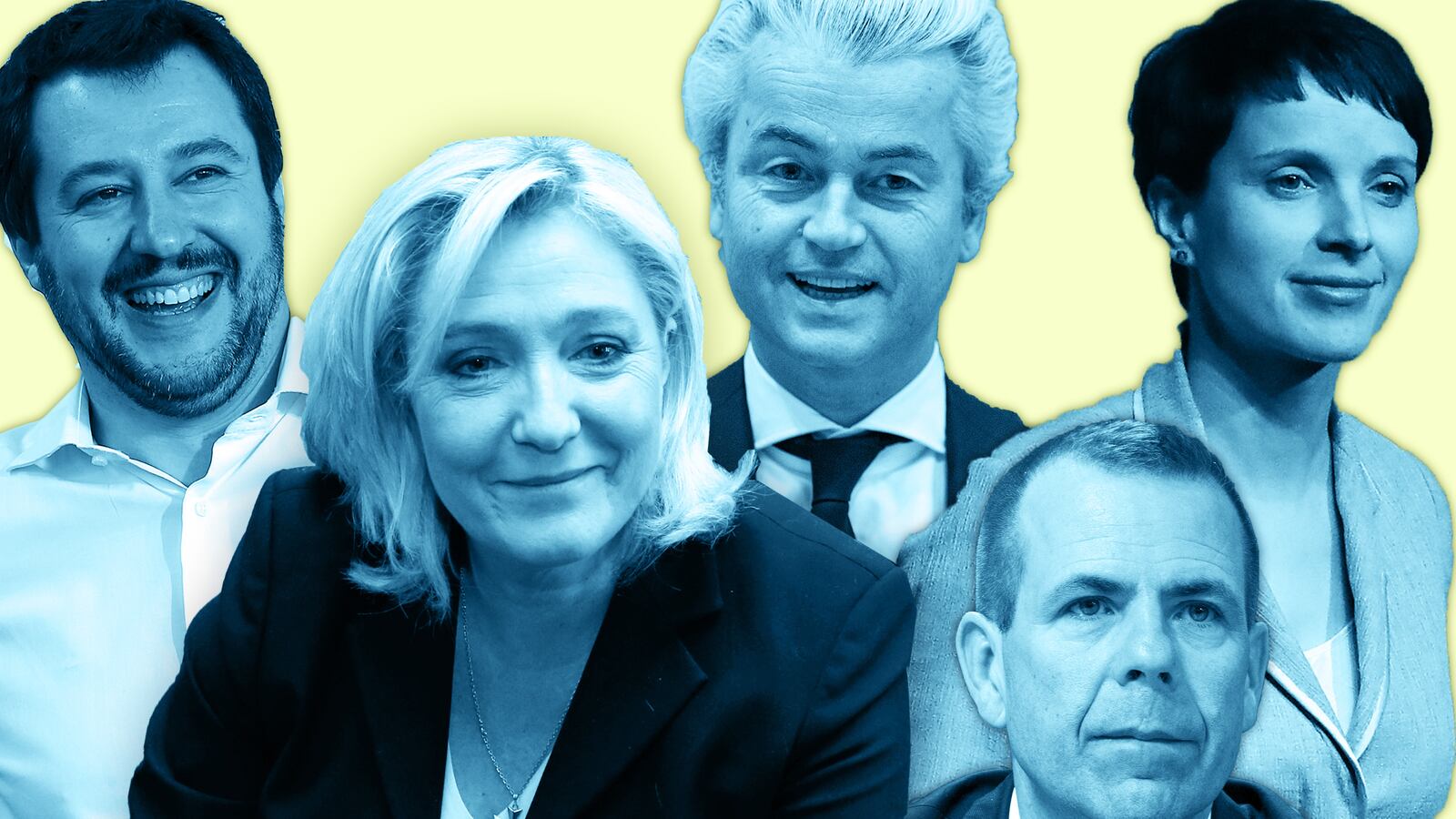KOBLENZ, Germany—Last year, they were still dining together in secret.
But on Saturday, one day after the world watched Donald Trump getting sworn in as president of the United States while pledging “America first,“ and as millions of women (and men) around the world marched in protest … and while Germany’s embattled Chancellor Angela Merkel was busy opening a museum, Europe’s emboldened far-right populists took to the stage together here for the first time in order to declare that they, too, will soon be elected the leaders of their countries.
They spoke of the possibility, the likelihood, the inevitability of their elections as if it were, at this point, a mere matter fate. Donald Trump could do it, and so could they! Even if, in fact, many have little in common with Trump or, indeed, with each other, his victory is their paradigm; his specific policies, to the extent they are discernible, not so much. And his wildly eccentric personality looms as a potential embarrassment.
French essayist Raphaël Glucksmann, writing for the liberal weekly L’Obs, summed up the dominant impression in Europe. Trump is like “a cocktail” of Italy’s former bunga-bunga prime minister, Silvio Berlusconi, the old xenophobic French National Front founder Jean-Marie Le Pen, and an acerbic TV comedian, but “he now has his hands on the most important army, the most important economy, and the most important diplomacy on the planet.” Moreover, as Glucksmann writes, “his team composed of frustrated generals, unabashed billionaires, reactionary ideologues, and admitted climate-change sceptics, will bear on its not-very-impressive shoulders our common destiny. It does no good to play down such a tragic perspective.”
But, here in Koblenz, none of that seemed to matter, at least for the moment.
“He is a winner, we are winners, everyone who is sitting here is a winner,” proclaimed Harald Vilimsky of the Austrian Freedom Party, which actually lost badly in the country’s presidential elections last month.
Never mind. Like Trump counting the crowd at his inauguration, the leaders assembled here believe what they want to believe, and, yes, there may be a great many in Europe more than willing to accept their “alternative facts.”
So it was that on Saturday a small crowd of fans and functionaries sat in a hall in Koblenz and waited for the entrance of Germany’s Frauke Petry, France’s Marine Le Pen, the Dutch populist leader Geert Wilders, Italy’s Matteo Salvini, and Austria’s Vilimsky.
(Missing from this picture was any sign of the United Kingdom Independence Party’s Nigel Farage, Trump’s Brexit promoting buddy who seems to regard some of the others as unsavory).
As the house lights grew dim, blue lights were projected onto the ceiling, and eerily reworked choir music began to play. Outside, thousands of counter-protesters were said to be gathering at the city’s central station. It all seemed intended to build an awkward sense of secrecy and something very verboten.
“Yesterday a new America, today Koblenz and tomorrow: a new Europe,“ announced Wilders, the Dutch populist leader, who is a free speech martyr to the far right and a hate speech convict to everyone else. “This will be the year of the people, of liberation, of the patriotic spring.”
* * *
Liberation from what? From the meddling clutches of ruling political parties, according to Petry, and the “tyranny“ of the European Union in its current form, as Marine Le Pen called it, before warmly promising a “Europe of Nations“ instead.
But fatalism and choir music aside, the fulfilment of the somewhat ironically titled “Freedom for Europe” promised by the conference organizers doesn’t exactly seem imminent.
Wilders’ Party of Freedom is predicted to do very well in elections in the Netherlands, but has yet to find another party willing to form a coalition with it. And Frauke Petry’s Alternative for Deutschland, riddled with infighting, will be lucky if it enters the Bundestag as a strong opposition party come Germany’s elections in September.
Le Pen meanwhile has feuded famously with her father Jean-Marie and her niece, and when she went to New York City recently, even visiting Trump Tower, she was reduced to drinking out of a paper cup in the lobby with no invitation to the gilded apartments of the then-president elect. (British journalists speculated Farage may have put the kibosh on that “informal” meeting.)
It’s widely predicted that Le Pen will face conservative former Prime Minister François Fillon in the second round of this year’s French elections, an event so negatively anticipated that it has already been labelled “Europe’s Stalingrad.”
But, as we’ve seen happen again and again in the last couple of years, there’s a new dark horse racing from behind in the polls: the radical former Socialist education minister, Benoit Hamon, who emerged Sunday night as the big winner in the first round of his party’s primary, handily defeating former Prime Minister Manuel Valls and crushing the rest of the field. Conceivably, Hamon will draw the kind of voters who went for Bernie Sanders in the United States: young, enthusiastic, cosmopolitan and egalitarian. That would not be good news for Le Pen.
At the moment, however, she’s calling the tune for continental populists, and setting the terms of debate for French politics.
* * *
After being introduced as “the lady with the loveliest smile in France,” Le Pen seemed to captivate the crowd Koblenz. “This immigration policy is a catastrophe!” she cried, accusing Merkel of letting refugees into Germany against the will of citizens and smaller businesses.
Vilimsky later warned the audience, which was notably dominated by grey-headed men, that anyone who tries to mess with “Our power women.. our Marine and our Frauke, is messing with all of us.”
And in fact, the official tone verged on the creepy avuncular more than once. (Even two suited AfD women were overheard sniggering about all the “altpartei Männer” in their party—men from “outdated” political parties, exactly what the AfD claims not to be.)
“Women have become afraid to show their blonde hair,” was the bizarre argument of Wilders (himself a peroxide blond) as he decried the “Islamization” of Europe. Meanwhile, Frauke Petry was introduced most enthusiastically as “pregnant” and “mother of four children.”
* * *
Petry’s husband Marcus Pretzell (the father of the child she’s carrying), is the AfD’s representative in the European parliament, and organized the Koblenz meeting. After making headlines last week when he tweeted about banning journalists from leading publications in Germany, Pretzell did a weird 180-degree-turn on Saturday morning by pointing out that “350 journalists from all over the world” had been granted access.
The disdainful Whites House spokesman Sean Spicer would no doubt have felt at home here as Pretzell sneered about “our fake friends” before calling out and mocking a journalist from the conservative Frankfurter Allgemeine Zeitung, who “apparently has so much interest in us that he got himself into this meeting with a court order.”
“Lügenpresse!” shouted several members of the audience. “Lying press!”
But when Pretzell went on to lament “what the EU was doing to Israel” and declare that “Israel is our future,” that was too much to take for some of his “real friends” from the audience, who got up to shout something incomprehensible in protest, and immediately were escorted out of the hall.
“Yeah, we have a few of those in the AfD,” an elderly party member called Heribert told The Daily Beast later, as he rolled his eyes. “People who have a problem with, um, Israel.”
One of the paradoxes of the far-right in Europe is that its early members often shared the same kind of anti-Semitic sentiments one encounters on the fringes of the already out-there alt-right in the United States. Le Pen has had to struggle, for instance, to distance herself from her father’s snide references to the Holocaust as a “detail” of history.
Last week, another leading AfD member (the hard-faced Björn Höcke) triggered a tremendous national uproar in Germany (and cheers from the Dresden crowd he was speaking to) when he attacked Holocaust atonement and complained that Germans were “the only people in the world who had planted a memorial of shame in the heart of their capital.”
According to Heribert, again rolling his eyes and sighing deeply, the German papers “carved up” Höcke’s words. He adds, “Tomorrow, for the first time in a long time, I am going to buy the papers— something serious, like the Frankfurter Allgemeine Zeitung or Die Welt. I’ll see how they wrote about this, how they hacked up into pieces these speeches that we all heard today.“
As we finished the interview, Heribert’s companion, a shorter man in a brown coat, muttered to him: “I’m proud of you.”
* * *
In the early afternoon, Vilimsky, in his charming Austrian accent, urged the audience to relish the image of 3,000 freezing protesters, who had walked through the town in the bitter cold to oppose the conference, singing Beethoven’s “Ode to Joy” and stood behind barricades outside.
“A pretty picture,” he grinned.
The local police, who were also on the streets, helped out the protest march by tweeting the Beethoven lyrics on their Twitter accounts. Even the town mayor took sides against the populists, stating, “These groups are cordially unwelcome to us.”
As the afternoon dragged on, several protesters continued to wait outside the hall behind the barricades.
“It’s unbelievable that these people are allowed to come together and do their politics. and that we have to pay for it,” a middle-aged woman muttered, as she shoved a bongo drum into her boyfriend’s car. (The event was paid for by the European Parliament’s Europe of Nations and Freedoms group.)
Konstantin, a nurse from Cologne, did the morning shift at the hospital where he works to take the train to Koblenz and join the protest.
About claims that dismiss the conference as mere photo opportunity for its partakers, Konstantin tells The Daily Beast, “When these people say ‘Wir sind das Volk’ [we are the people], then we have to show its not just their opinion that counts; they aren’t the only voice representing the ‘people.’”
Certainly that is true, but of course they have their alternative facts to present. Even when they lose, as the Austrian populists did, they are likely to claim, “We are winners.”
But it’s going to be a long few months as the Netherlands, France, and Germany vote. And there may yet be many surprises for the right as well as for everyone else.
Josephine Hüeblin reported from Koblenz, Christopher Dickey reported from Paris







